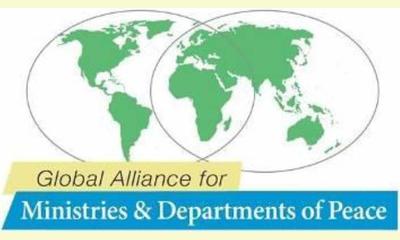|
|
The Fifth Summit of the Global Alliance for Ministries and Departments of Peace: Ubuntu in Action
un article par Karen Barensche (South African Peace Alliance), Mike Abkin and Mayra Gomez (Global Alliance for Ministries and Infrastructures for Peace) on website of National Peace Academy
The Fifth Summit of the Global Alliance for Ministries and Departments of Peace: Ubuntu in Action was a resounding success, from the Opening Ceremony featuring a keynote address by Sonja Kruse - the Ubuntu Girl, and performances by the Siyazama Cultural Group, to dynamic panel discussions led by expert peace practitioners. The South African Peace Alliance was chosen to host this year's Summit as a reflection of South Africa’s ability to overcome adversity and civil conflict, an achievement we celebrate as an organization, by which South Africa inspires other nations. With this Summit the Global Alliance expanded its mission to support the establishment of infrastructures for peace at all levels - local to national, regional and global.

click on photo to enlarge
The Global Alliance Summit was endorsed by Archbishop Desmond Tutu and US Congressman Dennis Kucinich, whose powerful words for peace resounded among those gathered at the Auditorium of the University of the Western Cape.
Representing civil society, academia and government from 19 countries and all 5 continents working toward peace infrastructure in their home countries, the Global Alliance Summit delegates and panellists included Ela Ghandi, former member of the Parliament of South Africa and granddaughter of Mohandas Gandhi; Karen Barensché, Executive Director of the South African Peace Alliance; and many other leaders in peacebuilding organisations, peace education, conflict resolution and grassroots activism.
Outcomes of the Summit include the formal incorporation of the Global Alliance under its new name, (Global Alliance for Ministries and Infrastructures for Peace), and the selection of its first Board of Directors – a true turning point in the history of the six-year-old organization.
Highlights of the six-day event include a Storytelling for Peacebuilding workshop, meaningful conversations facilitated through World Café methodology provided by Symphonia Leadership Development, the employment of Lekgotla – a traditional form of community dialogue, significant involvement of over 50 inspiring youth, a powerful presentation by the African Alliance for Peace, conversations on peace economics, sharing personal experiences of NGO and government collaboration in peacebuilding, a tour of the Robben Island Mayibuye Archives, and expressions of Ubuntu in action - celebrating local and regional solutions, grounded in traditional ways of dealing with conflict.
The Global Alliance is proud to support the Peace Abbey Courage of Conscience Award presented at the Summit Closing Ceremony to honour Nelson Mandela for his contributions to peace in South Africa, recognizing him as a leader in international peacebuilding.
Website: www.mfp-dop.org
|








|
DISCUSSION
Question(s) liée(s) à cet article:
Can the culture of peace be established at the level of the state?,
* * * * *
Commentaire le plus récent:
The state has come, over the centuries, to monopolize the culture of war. It would require a radical change in its very nature for it to abandon the culture of war and adopt a culture of peace.
For details on how the state has come to monopolize the culture of war, see The History of the Culture of War

|
|









